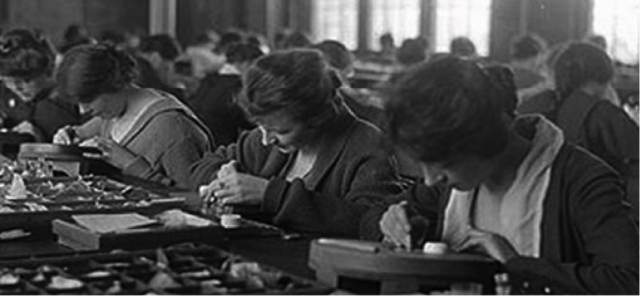Panel Discussion: "Radium Girls, Opening the Doors of Justice"
 This panel will discuss labor issues brought up in the play Radium Girls, playing Nov. 7 to 10 at Saint Mary’s. The panel discussion, titled “Radium Girls, Opening the Doors to Justice,” will take place on Friday, Nov. 8 from 1 to 2:30 p.m. in Welsh Parlor on the second floor of Haggar College Center. The panel discussion is free and open to the public. Click for a campus map. Call (574) 284-4626 for more information.
This panel will discuss labor issues brought up in the play Radium Girls, playing Nov. 7 to 10 at Saint Mary’s. The panel discussion, titled “Radium Girls, Opening the Doors to Justice,” will take place on Friday, Nov. 8 from 1 to 2:30 p.m. in Welsh Parlor on the second floor of Haggar College Center. The panel discussion is free and open to the public. Click for a campus map. Call (574) 284-4626 for more information.
Radium Girls is set in New Jersey the 1920s and is based on the true story of young factory workers who begin a campaign for justice after being sickened by radium-laced paint on the job. It is a fast-moving theatrical ensemble piece about greed, wealth, the environment, science, and courage.
Playwright D.W. Gregory, who wrote Radium Girls, will be on the panel, along with faculty from Saint Mary’s and the University of Notre Dame. Adrienne Lyles Chockley, PhD, attorney, and visiting assistant professor of justice education at Saint Mary’s, will moderate the discussion.
Here are the biographies of the panelists:
D.W. Gregory is the author of seven full-length plays and several award-winning short plays that have been produced throughout the United States and abroad from Singapore to Madrid. Her work has been funded through grants from the National Endowment for the Arts and the EST/Alfred P. Sloan Foundation Science & Technology Project. She is a playwright-in-residence at the New Jersey Repertory Co., where a new play, The Good Daughter, premiered in the fall of 2003. Gregory is a graduate of the Catholic University of America in Washington, D.C., where she makes her home with her husband, Paul, a bluegrass musician.
Patricia A. Fleming is provost/senior vice president of Academic Affairs and professor in philosophy at Saint Mary’s College. Fleming has published and lectured internationally on the ethical and epistemological issues associated with the disposal of high-level nuclear waste, including the use of expert elicitation methodology in site characterization, waste management and indigenous populations, informed consent in stakeholder populations, and circularity in regulatory policy. Fleming is appointed to the National Academy of Science Committee to Assess the Scientific Information for the Radiation Exposure Screening and Education Program. She is currently serving on the National Council on Radiation Protection and Measurements and working on ethical issues related to exposure to radiation from cosmic and galactic sources for astronauts who would travel to Mars.
Kelly Hamilton is an associate professor in the Department of History at Saint Mary’s College. Hamilton teaches European history, women’s history, social history, cultural history, and the history of ideas. She is currently working on a project on visual thinking (thinking in 3D) in the sciences, technology, and arts. She presented two chapters from her work at the Electronic Visualization and Arts, EVA, Conference in London.
Dan Graff is a labor historian at the University of Notre Dame, where he serves as director of undergraduate studies in the Department of History and associate director of the Higgins Labor Studies Program. A recipient of Notre Dame’s Joyce Award for Excellence in Undergraduate Teaching in 2011, Graff offers a variety of political and social history courses such as Labor & America since 1945; Food, Work, and Power in American History; Abraham Lincoln’s America; and The Right to Vote in American History. His research focuses primarily on the 19th-century U.S., as he investigates conflicts over slavery and freedom, workers’ rights within the emerging democratic capitalist republic, and gender and racial ordering of economic opportunities. He is currently writing a book on race, labor, and citizenship in 19th-century St. Louis.
Barbara J. Fick joined the Notre Dame Law School faculty in 1983. Fick’s teaching and scholarship concentrate on various aspects of labor law such as employment discrimination, individual rights in the workplace, and international and comparative labor law. Since 1995 Fick has worked with the American Center for International Labor Solidarity advising and teaching trade union leaders in Central and Eastern Europe on issues relating to protecting worker rights and ensuring domestic compliance with international labor standards. Fick was a member of the Executive Board of the U.S. branch of the International Society for Labor and Social Security Law from 2006 to 2012. She is currently a University of Notre Dame faculty fellow at both the Institute for International Peace Studies and the Higgins Labor Studies Program.
